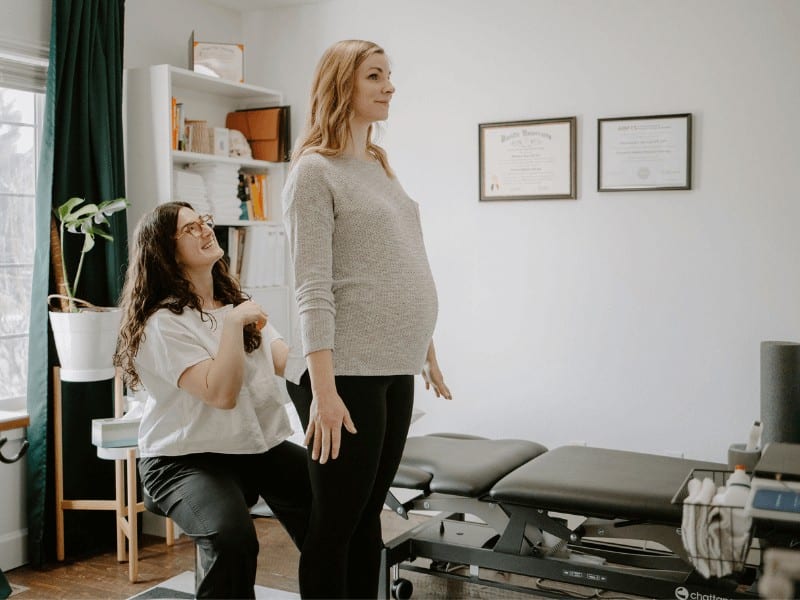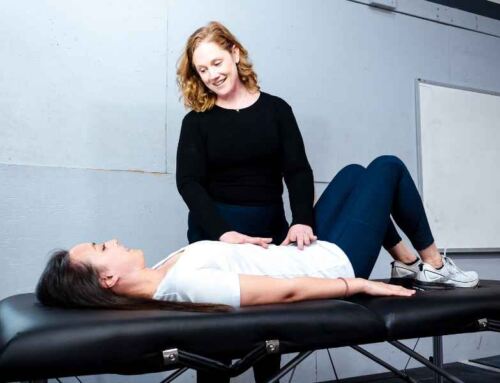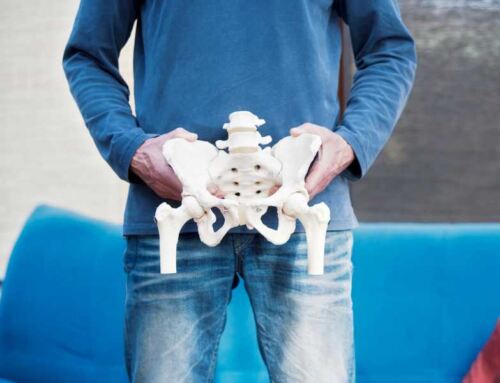Top Tips for Pelvic Health Rehabilitation After Pregnancy
It is a common misconception that you should wait to see a pelvic health or obstetrics specialist physiotherapist until after you’ve had your baby.
While pelvic health physiotherapy is gaining popularity and traction, preventative care with a pelvic health physical therapist has been the norm in other developed countries for decades. Postpartum care is important, but why wait to address irritations in your body when you don’t have to?
There are a host of things that a pelvic health PT can help you treat, prevent, as well as optimize your body mechanics in preparation for labor!
An appropriately trained pelvic health & obstetric physiotherapist will consider not only what your pelvic floor can do but also the capacity of your pelvis, ankles, knees, hips and spine.
Common Ailments During Pregnancy
Some of the most common complaints of pregnant people include low back pain, pelvic girdle pain and pubic symphysis pain, commonly referred to as lightning crotch.
One 2012 study suggested that 50% of pregnant individuals experience one of these forms of pain and another study suggested that those who self rated their pain as moderate to severe would avoid future pregnancies because of their pain. Other dysfunctions include urinary incontinence (peezing), waking at night to pee, constipation (hello first trimester!), diastasis rectus abdominis and many other things.
None of these complaints are something you should settle for. Many times, if left unaddressed, they get worse as pregnancy progresses and even are more likely to return or perpetuate in the postpartum period. One study suggested that those who experienced stress incontinence of urine (leakage with a sneeze, cough, laugh, jump) had a 5.8 times more likely to still have it at 1 year postpartum!

Benefits of Pelvic Health Rehab During Pregnancy
Pelvic health and obstetric physiotherapists are the primary specialists that address all of these complaints (and more)! We can help prevent them and effectively treat them when you’re in the thick of it.
Pelvic health physios also help prepare the birthing partner for labor with education and bodywork as well as teach you and your partner how to decrease your risk of tearing the perineum during vaginal birth!
All of this improves a pregnant person’s quality of life, gives them real tools to use, empowerment and confidence to walk through this exciting time in their life!
Click here to request a session with one of our pelvic health PT specialists today.
When to Seek Out Rehab Specialist Assistance
The beauty of the MovementX model is that you don’t necessarily have to have dysfunction to see a pelvic health specialist.
Even if you are thinking about getting pregnant and want to identify areas of improvement in your training, strengthen for prevention of dysfunction during pregnancy and get some practical advice on how to prepare for an impending pregnancy, pelvic health and obstetric certified PTs are the people for you!
Nevertheless, should you experience any of the following, it is imperative you seek out assistance from a rehab professional trained in pelvic health and obstetrics:
- Involuntary loss of of feces, urine, gas (incontinence)
- Low back, pelvic pain
- Pain with sex, gynecological exams
- Difficulty emptying bowels or bladder
- Increased frequency of urination or bowel movements
- Increased urgency of bowel or bladder
- Difficulty with exercising due to feeling unstable or because of pain
- Excessive pelvic pressure or heaviness with daily activities or exercise

What to Expect During a Pelvic Health PT Session
Pelvic health and obstetrics PTs are just like any other PT—they’re concerned with strength, endurance, range of motion, power, and coordination. They will assess how your whole body works in its individual parts, including the pelvic floor muscles, and then as a whole!
Depending on your goals and complaints they will suggest a pelvic floor muscle assessment—it feels a lot like a gynecological exam (but without a speculum and stirrups) and with much more focus on coordination, strength, endurance, power and range of motion of the local muscles. They will also assess the spine, pelvis and abdomen with the same critical process as mentioned above.
With the appropriate training, your pelvic health physical therapist can also spend at least a visit showing your partner how to desensitize your perineum to decrease your risk of tears during pushing, discomfort management strategies for labor for the birthing partner and support techniques for the supporting partner, positioning suggestions based on your biomechanics, coordination training for how to push most effectively and tips for the first few hours/days home and that first *insert ominous music* postpartum poop!
Conclusion
Pelvic health PT can sound intimidating but the benefits far outweigh the costs! An ounce of prevention is always worth more than a pound of cure. It is never “normal” to hurt just because you are pregnant, it is never normal to leak just because you gave birth, and these things are never something you should have to settle for. In a society where perpetuating the human race is not valued (that’s another subject for another day), access to care such as this is not standard practice even though it should be. You deserve care and are worthy of time and investment and in doing so you rebel against the norm! Join that movement with me or, better yet, whomever is accessible to you in your community.
References
- Malmqvist, S., Kjaermann, I., Andersen, K., Økland, I., Brønnick, K., & Larsen, J. P. (2012). Prevalence of low back and pelvic pain during pregnancy in a Norwegian population. Journal of Manipulative and Physiological Therapeutics, 35(4), 272–278. doi: 10.1016/j.jmpt.2012.04.004
- Brynhildsen, J., Hansson, A., Persson, A., & Hammar, M. (1998). Follow‐up of patients with low back pain during pregnancy. Obstetrics & Gynecology, 91(2), 182–186.
- Diez‐Itza, I., Arrue, M., Ibañez, L., Murgiondo, A., Paredes, J., & Sarasqueta, C. (2010). Factors involved in stress urinary incontinence 1 year after first delivery. International Urogynecology Journal, 21(4), 439–445. doi:10.1007/s00192‐009‐1055‐y
About the Author
Mackenzie Van Loo, PT, DPT is a physical therapist and pelvic health specialist in Bend, OR. She is a Board Certified Women’s Clinical Specialist (WCS) and has a certificate of achievement in Obstetrics (CAPP-OB). Mackenzie aims to provide exceptional service rooted in wisdom and intention to combat the physical injustices of this world. Click below to request a session with her today.








